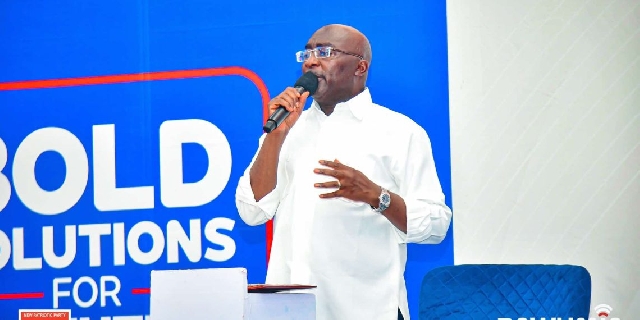Bawumia’s ‘1 region, 1 duty-free zone’ policy sparks debate over existing Free Zones Act
 Dr Bawumia on his campaign trail in Ashanti Region
Dr Bawumia on his campaign trail in Ashanti Region
A statement by Vice President Dr. Mahamudu Bawumia on plans to make every regional capital in Ghana a duty-free zone if elected President has ignited debate, with critics arguing that the initiative already exists under current law.
Dr. Bawumia, speaking on his campaign trail, promised that the policy would ease the cost of doing business and support entrepreneurs.
However, policy analyst and Founding President of the UP Tradition Institute, Dr. Razak Kojo Opoku, has challenged the originality of the proposal.
According to Dr. Opoku, Ghana already operates several duty-free areas under the Ghana Free Zones Act, 1995 (Act 504). The Act established the Ghana Free Zones Authority (GFZA) to oversee the creation of free zones and export processing areas across the country.
“Claims that Ghana has only one duty-free zone in Tema are misleading.
Under Act 504, multiple free zones exist across the country,” Dr. Opoku stated.
Among the listed duty-free and export processing zones are the Ashanti Technology Park, Sekondi Export Processing Zone, Shama Export Processing Zone, and the Tema Free Zone.
In addition, other ongoing special economic zone projects include the Greater Kumasi Industrial City Project, Builsa Agro-Processing Park, West Park at Shama, and the Savelugu Industrial Park.
The Ghana Free Zones programme is structured around three categories:
Industrial Free Zones, which facilitate the importation of raw materials for manufacturing products for export.
Commercial Free Zones, which allow for the handling and re-processing of imported goods for re-export.
Service Free Zones, which provide specialised services to free zone enterprises.
Dr. Opoku stressed that while duty-free facilities may be useful, business leaders in Ghana are more concerned with broader economic issues such as exchange rate stability, inflation control, and interest rate management.
“What is seriously paramount to the businesspersons and the general business community is management of the exchange rate, inflation, and the policy rate—which drives loan interest rates at the banks—not necessarily duty-free zones in each region,” he said.
He further advised Dr. Bawumia to establish what he described as a “semi-permeable team of elders and researchers” to vet and validate campaign promises before they are announced, in order to avoid “unnecessary backlash or attacks.”
Source: classfmonline.com/Cecil Mensah
Trending News

Farmers' Day: Overall best farmer takes home GHS 1.2 million, tractor and full farm package
09:53
Kumawu MP donates to support Farmers’ Day celebration in his district
10:14
U/E: Tensions rise over Upper East Regional Airport Project as Alagumbe Association accuses Minister of sidelining key stakeholders
10:48
Foreign Affairs Minister welcomes resumption of Delta’s Accra–Atlanta flights, praises new Ghana–Canada route
14:18
Ghana records 12,600 AIDS-related deaths annually-Gov't says on World AIDS Day
13:11
Eminent Africans demand release of Guinea-Bissau election results
08:15
PAOG warns prospective pilgrims: Saudi Arabia to enforce strict permit regulations for Hajj 2026
09:49
Bawumia gets rainy endorsements ahead of NPP Primary in 2026
10:38
High Court explains why it ordered full Kpandai parliamentary rerun
13:05
Avenor must unite for development — First Deputy Speaker Bernard Ahiafor urges at 2025 Tutudo festival
12:21




